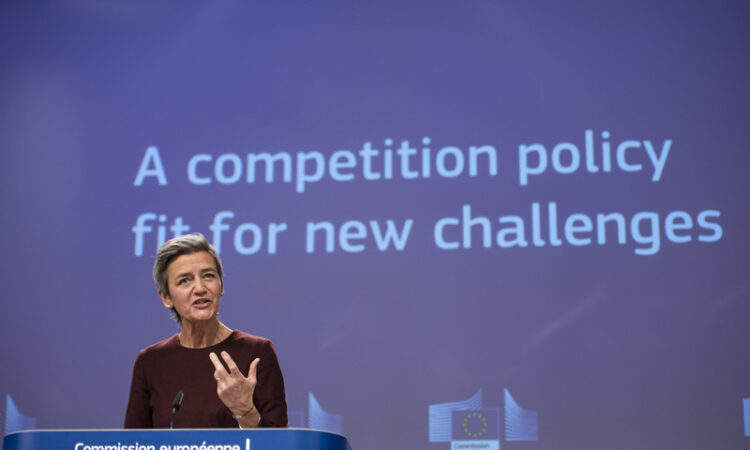
The European Commission has tabled a proposal to strengthen so-called ‘economic security’ in the bloc.
“The simple observation is that there is fierce competition worldwide for the technologies that we need the most,” competition commissioner Margrethe Vestager told press on Wednesday (24 January).
“Europe cannot be the playground for bigger players. We need to be able to play ourselves,” she added.
The plan consists of a wide range of measures, including stricter checks on foreign direct investments and more rigorous controls on exports, research partnerships and investments made in countries deemed economic rivals, especially China.
Foreign investments
One building block is tighter control on foreign direct investments (FDI) in EU countries.
Screening of these investments is not new. Regulation has been in force since 2020.
But the plan presented on Wednesday, however, is meant to harmonise established rules and tighten the screws where necessary.
The first step is to apply screening everywhere. Currently, 22 member states perform screening on foreign investment, up from 14 three years ago. The new plan requires all EU governments to apply screening.
Also, it has to be more targeted. The EU and member states have already screened 1200 investments in the past three years. However, according to a recent EU Court of Auditors report, officials waste too much time looking at low-risk investments.
Therefore, the new rules identify some core economic sectors where officials should focus their attention, which include energy infrastructure and cybersecurity.
The official said these checks would not be “discriminatory per se” but suggested investments made by economic rivals would likely be looked at more closely.
Export controls?
The commission also proposed tightening measures for exports.
Although export controls will remain in the hands of member states, the commission believes all EU countries should perform the same controls on critical technologies, which include semiconductors, artificial intelligence, biotechnology and quantum computing.
Other items highlighted in the rules are technologies used for both civil and defence use, like toxins, drones, nuclear technology, or chips, which can be used in refrigerators but also in missiles.
The commission proposed that these technologies be subject to uniform EU-wide export controls, avoiding a chaotic patchwork of national controls.
Tech ‘leakage’
A topic linked to export controls is the “undesirable” leakage of know-how to other countries via research partnerships, which in the past were mostly uncontrolled.
The EU is one of the world’s biggest foreign investors in technology and research. These so-called ‘outbound investments’ are currently not monitored.
But there is growing concern that some of these investments could enhance the military capabilities of economic rivals.
Investigative journalists, for example, revealed in 2022 that European universities had collaborated with the Chinese military on 3,000 occasions since 2000. “This may not have been illegal, but the question is: is it desirable?” asked Vestager.
To this end, the commission proposed analysing these investments to understand potential risks better.
Other initial suggestions include universities providing their staff with a list of questions that should be answered before engaging in collaborations with foreign institutions.
Vestager also mentioned a requirement for universities to guarantee the anonymity of whistleblowers to report misconduct, although no details about this are available at this point.
Research investment collaborations under HorizonEU, one of the EU’s main innovation funds, have been excluded for Russia and Belarus. Entities based in China can also no longer qualify for EU innovation funding.
Open economy
EU officials are treading carefully, however, as national governments carefully guard exports and investments as national competencies, and a final decision will not be made before mid-2025, the EU official told EUobserver.
Although the commission is convinced more controls are needed, EU officials also want to protect Europe’s open economy.
“The EU has always been an open economy. And this openness is our strength,” trade commissioner Valdis Dombrovskis said on Wednesday.
Therefore, member states will now have 12 months to gather information and assess the need for export and outbound investment controls.
The commission and national governments will decide if and which policies are warranted based on the outcome.






